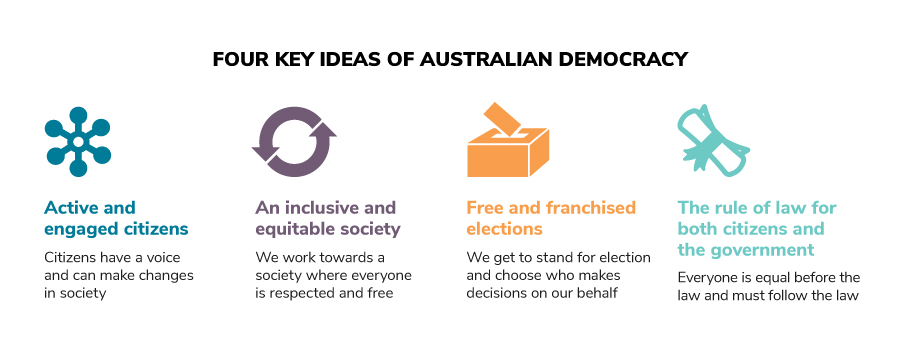Democracy discussion starters for all students
Use these discussion starters to explore different concepts as part of the Unpack democracy classroom activity.
Getting started
Introduce the word 'democracy' to your students. Democracy means rule by the people. The word comes from the ancient Greek words ‘demos’ (the people) and ‘kratos’ (to rule). A democratic country has a system of government in which the people have the power to participate in decision-making.
Each democracy is unique and works in different ways. In some democracies citizens help make decisions directly by voting on laws and policy proposals (direct democracy). In others, like Australia, citizens choose representatives to make decisions on their behalf (representative democracy).
Australia’s democracy is supported by 4 key ideas:
As a class, brainstorm some different examples of ways in which Australia is democratic. Use the discussion starters to explore the 4 key ideas of Australia's democracy.
Under each democratic idea, discussion starters are listed from easier (personally relatable) to more complex (abstract thinking). Select the ones that will work best for your class and the discussion strategy you have chosen.
Democracy key ideas.

Parliamentary Education Office (peo.gov.au)
Description
This diagram illustrates the 4 key ideas of Australian democracy:
- Active and engaged citizens—Citizens have a voice and can make changes in society.
- An inclusive and equitable society—We work towards a society where everyone is respected and free.
- Free and franchised elections—We get to stand for election and choose who makes decision on our behalf.
- The rule of law for both citizens and the government—Everyone is equal before the law and must follow the law.
Copyright information
This work is licensed under a Creative Commons Attribution-NonCommercial-NoDerivs 3.0 Unported License.
You are free to share – to copy, distribute and transmit the work.
Attribution – you must attribute the work in the manner specified by the author or licensor (but not in any way that suggests that they endorse you or your use of the work).
Non-commercial – you may not use this work for commercial purposes.
No derivative works – you may not alter, transform, or build upon this work.
Waiver – any of the above conditions can be waived if you get permission from the copyright holder.
Active and engaged citizens
Citizens have a voice and can make changes in society.
- What is a change you’d like to see in your school or local community?
- Can you do anything about it? If not, who is responsible for the problem/issue?
- If the problem is bigger than your community, what could you do to make a change?
- Who is responsible for Australia’s democracy? How are they responsible?
- Can you think of ways to make our country more democratic?
- Is violence ever justifiable? Can you think of an example where violence was needed for freedom?
- How can big changes be made without the use of violence?
An inclusive and equitable society
We work towards a society where everyone is respected and free.
- Brainstorm a list of freedoms you think are important in your school community. Are some more important than others?
- Which of these freedoms are most important to you?
- Is democracy best for everyone? Why or why not?
- Is it harder for some people to have their say than for others?
- What’s more important—majority rule or individual freedom? Why?
- How might Australia be different if we were not a democracy?
Free and franchised elections
We get to stand for election and choose who makes decisions on our behalf.
- What experiences have you had with different ways of making decisions?
- Why should citizens be able to choose who represents them?
- Why is the media important in a democracy?
- What powers do voters have between elections?
- Could dictators ever be good?
- What is the biggest threat to democracy?
A rule of law for both citizens and the government
Everyone is equal before the law.
- When have laws or rules kept you safe or protected your freedom or rights?
- Should the law ensure everyone gets a fair go?
- Why is it important for everyone to follow the law?
- Is everyone equal before the law? Why or why not?
- Is it fair for the law to treat everyone exactly the same?
